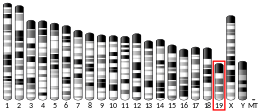Protein-coding gene in the species Homo sapiens
Potassium channel subfamily K member 18 (KCNK18), also known as TWIK-related spinal cord potassium channel (TRESK) or K2P 18.1 is a protein that in humans is encoded by the KCNK18 gene . K2P 18.1 is a potassium channel containing two pore-forming P domains.[5]
A flaw in this gene could help trigger migraine headaches. If the gene does not work properly, environmental factors can more easily trigger pain centres in the brain and cause a severe headache.[6]
See also References
^ a b c GRCh38: Ensembl release 89: ENSG00000186795 – Ensembl , May 2017^ a b c GRCm38: Ensembl release 89: ENSMUSG00000040901 – Ensembl , May 2017^ "Human PubMed Reference:" . National Center for Biotechnology Information, U.S. National Library of Medicine .^ "Mouse PubMed Reference:" . National Center for Biotechnology Information, U.S. National Library of Medicine .^ Goldstein SA, Bayliss DA, Kim D, Lesage F, Plant LD, Rajan S (December 2005). "International Union of Pharmacology. LV. Nomenclature and molecular relationships of two-P potassium channels" . Pharmacol. Rev . 57 (4): 527–40. doi :10.1124/pr.57.4.12 . PMID 16382106 . S2CID 7356601 . ^ Lafrenière RG, Cader MZ, Poulin JF, Andres-Enguix I, Simoneau M, Gupta N, Boisvert K, Lafrenière F, McLaughlan S, Dubé MP, Marcinkiewicz MM, Ramagopalan S, Ansorge O, Brais B, Sequeiros J, Pereira-Monteiro JM, Griffiths LR, Tucker SJ, Ebers G, Rouleau GA (September 2010). "A dominant-negative mutation in the TRESK potassium channel is linked to familial migraine with aura". Nature Medicine . 16 (10): 1157–1160. doi :10.1038/nm.2216 . PMID 20871611 . S2CID 205387180 .
Further reading
Andres-Enguix I, Shang L, Stansfeld PJ, Morahan JM, Sansom MS, Lafrenière RG, Roy B, Griffiths LR, Rouleau GA, Ebers GC, Cader MZ, Tucker SJ (2012). "Functional analysis of missense variants in the TRESK (KCNK18) K+ channel" . Scientific Reports . 2 . article number 237. doi :10.1038/srep00237 . PMC 3266952 PMID 22355750 . Czirják G, Tóth ZE, Enyedi P (2004). "The two-pore domain K+ channel, TRESK, is activated by the cytoplasmic calcium signal through calcineurin" . J. Biol. Chem . 279 (18): 18550–8. doi :10.1074/jbc.M312229200 PMID 14981085 . Kang D, Mariash E, Kim D (2004). "Functional expression of TRESK-2, a new member of the tandem-pore K+ channel family" . J. Biol. Chem . 279 (27): 28063–70. doi :10.1074/jbc.M402940200 PMID 15123670 . Barrios-Rodiles M, Brown KR, Ozdamar B, et al. (2005). "High-throughput mapping of a dynamic signaling network in mammalian cells". Science . 307 (5715): 1621–5. Bibcode :2005Sci...307.1621B . doi :10.1126/science.1105776 . PMID 15761153 . S2CID 39457788 . Czirják G, Vuity D, Enyedi P (2008). "Phosphorylation-dependent binding of 14-3-3 proteins controls TRESK regulation" . J. Biol. Chem . 283 (23): 15672–80. doi :10.1074/jbc.M800712200 PMC 3259650 PMID 18397886 . Pottosin II, Bonales-Alatorre E, Valencia-Cruz G, et al. (2008). "TRESK-like potassium channels in leukemic T cells". Pflügers Arch . 456 (6): 1037–48. doi :10.1007/s00424-008-0481-x . PMID 18506476 . S2CID 3245155 . Sano Y, Inamura K, Miyake A, et al. (2003). "A novel two-pore domain K+ channel, TRESK, is localized in the spinal cord" . J. Biol. Chem . 278 (30): 27406–12. doi :10.1074/jbc.M206810200 PMID 12754259 .
External links



